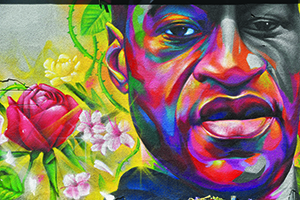
The death of George Floyd (memorialized here in a mural on Colfax Avenue in Denver) unleashed a monumental demand for racial justice. Helen H. Richardson/Media News Group via Getty Images
Outrage over the deaths of Black people at the hands of police officers and vigilantes spurred civil rights activism that brought protesters to the streets in hundreds of U.S. cities and towns this year.
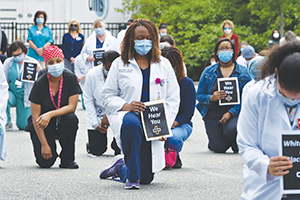
Workers at St. Joseph's Wayne Medical Center in New Jersey take a knee as part of a "White Coats for Black Lives" vigil June 16. Simultaneous events were also held at the system's facilities in Paterson and Cedar Grove in New Jersey to support the call for racial justice. White Coat demonstrations were held at many hospitals across the nation to show solidarity with the calls for racial justice.
The demonstrations against racial injustice are happening in the throes of a pandemic that is taking a disproportionate toll on people of color, particularly Blacks, Hispanics and Native Americans. The mortality and morbidity data underscore how much work there is to do to address health care disparities tied to race and poverty, so that all people have an equal opportunity to lead healthy lives and have full lifespans.
Catholic Health World invited ministry leaders from a variety of professional disciplines to share their perspective on the fight for racial justice and health equity. They spoke about how the new civil rights movement is influencing their actions and work, and how Catholic health care can be a force for meaningful societal change.
Damond Boatwright
SSM Health's regional president of operations in Wisconsin
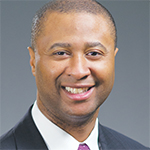
Boatwright
The U.S. has endured waves of conflict and divisiveness throughout its history, but Damond Boatwright worries that the current one threatens to overwhelm the nation.
"As I've watched both the peaceful and civil demonstrations that have swept the country, juxtaposed with the violence and looting and confrontations with police, I have been left feeling very worried about the very fabric of our society seemingly coming unraveled, it's unlike anything I've seen in my lifetime," he says.
Boatwright says Catholic social teachings that center around the dignity of human life, fairness and social justice offer a path for unifying a divided country. For that to happen though, he says ministry leaders like him have to step up. "I need to do my part and lean into the situation more intentionally than I have before to try to find solutions to problems that many people face."
One way Boatwright is pushing for progress is through the Regional Inclusion, Equity and Diversity Advisory Council, a group he founded and leads for his region of SSM Health. Its goals include recruiting a workforce that represents and reflects the communities SSM Health serves and encouraging those workers to develop and maximize their full potential.
Despite his angst over the current state of the nation, Boatwright harbors hope because there are people of various social backgrounds, ethnicities, genders and sexual identities demanding an end to race-based injustice.
"I do fundamentally believe that good will always conquer evil, and I see the prospect for positive change, and, I dare say, even inclusion," he says. "I see very positive signs of that happening because the peaceful demonstrations today — not the looting, not the violence and the other activity — but the peaceful demonstrations today look to be even more diverse and inclusive than even the diversity that happened during the civil rights movement."
— LISA EISENHAUER
Angela M. MacDonald
System director, mission integration, CHRISTUS Health, Irving, Texas
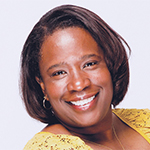
MacDonald
A horrific video of a white police officer kneeling on the neck of George Floyd, who was unable to breathe and died during the restraint, fueled widespread shock and fury — and ensuing protests across the U.S. this spring and summer. Angela MacDonald says she thinks the fact that people viewed the video in the context of the pandemic contributed to its resonance. "Being in a pandemic has forced us to be still, whether we want to or not. And when you have the time to watch a video like the one of George Floyd's death, you can't run from it, you can't run from how egregious it was to witness. You can't run from the visceral reactions that you are having at this blatant disregard for humanity daily. You can't compartmentalize it and go about your list of tasks."
Violence against Blacks in America dates back at least 400 years to the start of the slave trade. "These are not new episodes, these are historical," MacDonald adds. "Again, when the world has to be still, you end up with some surprise witnesses. And I think that has been the catalyst."
She says like so many people in the U.S. — particularly people of color — ministry employees are grieved as they process emotions brought to the surface by the video and related triggers. She is encouraged as Catholic health systems find ways to support associates through the emotional trauma. She says that it is a great beginning that Catholic health systems are offering programming that helps identify ways to be emotionally resilient and give direction on how to thoughtfully engage in uncomfortable conversations about race.
MacDonald says she thinks that concentrating on the goal of the protests — equal justice — will help advance the cause for racial equality. She says of those who are trying to promote conversation and understanding: "Please keep trying. We get closer to true healing" each time the country confronts these unreconciled social issues.
— JULIE MINDA
Dr. Samuel L. Ross
Chief community health officer, Bon Secours Mercy Health
Dr. Samuel L. Ross is in solidarity with the protesters who have demonstrated for racial justice this year. But he has been saddened that their righteous message has been sullied at times by violence.
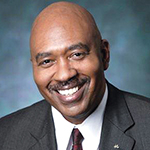
Ross
"I think most people in this country support peaceful protests because that's who we are as a nation and the right to protest has been exercised since the Boston Tea Party," Ross says. "I would hope that we would not let the violence water down or detract from the real message, which is that we have a problem in this country, a problem that has existed for decades and needs to be acknowledged and addressed."
Ross believes Catholic health ministries have had and will continue to have a role in addressing that problem of inequality because their mission is based on social teachings that call for respecting the human dignity of everyone and improving the overall well-being of communities. They are doing that, he says, by providing access to health care and by funding programs that tackle some of the root causes of poor health such as the lack of affordable housing, jobs that pay a living wage and child care.
But he says they also need to commit to long-term efforts to address the structural racism that keeps people of color from achieving their potential. "That's going to take more time and resources," Ross says, and require ongoing advocacy and building relationships with stakeholders in creating a more just society that can move the nation in the right direction.
In his leadership role at Bon Secours Mercy Health, he supports hiring practices that provide opportunities across the communities the system serves and leadership development practices that are inclusive to all employees. "We have to always believe that positive change is going to come," Ross says. "However, our teaching, our values and our behaviors must be more intentional and sustainable. It is the work God has called us to do with commitment and courage."
— LISA EISENHAUER
Lydia Jumonville
President and chief executive of SCL Health, Broomfield, Colorado
The renewed urgency around racial equality and social justice has prompted Lydia Jumonville to look inwardly at what she and her health system are doing to promote diversity, equity and inclusiveness and at what more they can do. "I think it's caused us all to pause and say, 'Are the things that we're doing helping move this along in as appropriately expeditious a way as possible?'" she says.
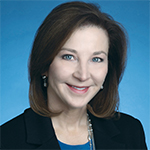
Jumonville
In response to the calls for change, Jumonville over the summer joined 29 other chief executives who became founding members of Colorado Inclusive Economy, a group that describes itself as committed to rebuilding the state's economy "in a way that works for all." She says she and the group's other leaders "are really dedicated to envisioning and operationalizing a Colorado that is more equitable and inclusive." The leaders will share best practices and provide an open discussion toward that goal.
Within SCL Health, Jumonville and her leadership team are sharpening their focus on health disparities and how best to address them. They are now at work on a five-year strategic plan that she says will focus on how to best measure health disparities and from there act with intention on how SCL Health can help impact and create more health equity in the communities the system serves.
Jumonville says the overhang of health disparities was evident in the uneven impact of the COVID-19 pandemic. When the illness slammed the Native American population in Montana, SCL Health leaders worked with tribal leaders to provide education about the disease and care for those who were stricken in a culturally sensitive way. As the surge in cases pushed the system's resources to the brink, dozens of SCL Health associates in Denver volunteered to go to Montana to help out.
"I've seen incredible collaboration and many positive things coming out of our response to COVID," Jumonville says.
— LISA EISENHAUER
Dr. Rhonda Medows
President, population health management at Providence St. Joseph Health, Renton, Washington
Dr. Rhonda Medows understands why people feel compelled to protest police and racist violence. The high-profile deaths of Black Americans like Ahmaud Arbery, Breonna Taylor and George Floyd are "just the latest in what has become an intolerable injustice," she says.
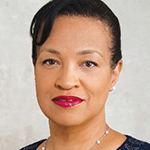
Medows
"For me, the street protests, when done peacefully, are the best way that I know how for people to raise their voice, raise the issue and get the attention of people in our community, people in our government, and people who are neighbors, to understand the harm and hurt that we suffer," Medows says.
Systemic racism denies people opportunities and harms their health, Medows says.
Medows emphasizes that race-related disparities in treatment impact the health outcomes of people of color regardless of whether they are poor or wealthy. "And we know this because we've been measuring (treatment disparities), researching them, and talking about them for as long as I can remember." Racism alone, she says, can make people vulnerable to unequal care.
In Medows' view, everyone in health care and social services has a responsibility to speak out about the harmful impacts of racism, but she thinks the Catholic health care ministry because of its grounding in equality and human rights is compelled to go beyond words to action. The ministry, she says, should focus on "how do we make sure that we recognize injustice, that we stop it, that we resolve it and that we help others stop the impact from long-standing bias and racist systematic changes."
Medows is herself speaking up more and sharing her own experiences as a Black woman and those of her family and community. "It's actually encouraged me to talk more, engage more, have more discussions, some of which are really uncomfortable for both me and the person that I'm discussing with, but they are necessary."
— LISA EISENHAUER
Linda Townsend
Vice president, advocacy and public policy at CHRISTUS Health, Irving, Texas
Recently, Linda Townsend watched the documentary I Am Not Your Negro, about writer and civil rights activist James Baldwin. Seeing some of the images in the film, she was struck by how little things had changed in race relations from the 1950s and 1960s era it depicts to the present. "It's sad, it's heartbreaking, it's frustrating just how little progress we've actually made with race relations in this country," Townsend says.
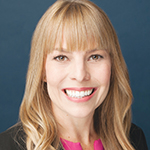
Townsend
The nation is so divided politically that people seemingly can't even agree on facts anymore, she says, adding that two people may experience the exact same thing and fundamentally disagree on what happened, let alone how to interpret it.
As she prepares to lobby on behalf of CHRISTUS Health during the session of the Texas Legislature that will convene just after the first of the year, she sees how those different perceptions are already playing out. The governor, for example, is responding to the racial protests with a "Back the Blue" pro-police agenda while Black lawmakers are urging criminal justice reforms. "I see these issues setting up to be at odds with one another when I don't think that it necessarily has to be that way," she says.
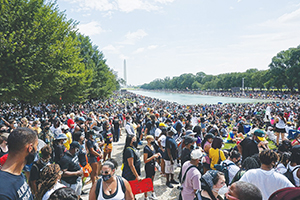
Thousands of demonstrators gather at the Lincoln Memorial in Washington, D.C., for the "Get Your Knee Off Our Necks" march in support of racial justice on Aug. 28. The title of the march was a reference to the death three months earlier of George Floyd, who died when a Minneapolis police officer kneeled on his neck for 7 minutes, 46 seconds despite his pleas that he couldn't breathe.
While there is rancor in the legislature, Townsend thinks society is "on the precipice of maybe making real change. It feels like that," she says. "It feels like as leaders in our communities and as Catholic health care, we have a place to weigh in on that."
She also takes heart in the clarity with which her twin 6-year-old daughters see equality and fairness for all. "To them, it is so obvious. They cannot even understand why we're talking about it," Townsend says. "That gives me hope, because that's our next generation."
— LISA EISENHAUER
Corinne Francis
System vice president, mission integration, CommonSpirit Health, Chicago
Growing up in the Caribbean's Dominica and Virgin Islands, Corinne Francis says she had little exposure to toxic racism. After she moved to the mainland U.S. in 1993, she made new friends of color, people who explained to her the systemic racism they grew up with. "I think that the George Floyd issue brought it closer to home to me in the sense that this is the experience that my friends have been telling me about — that they've lived with all of their lives."
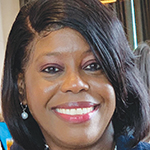
Francis
Francis says she was "appalled and heartbroken and saddened by the fact that someone could be killed at the hands of police, and the videos to me were very clear. There was no misconception of what happened in that video to George Floyd. Any injustice to anyone is an injustice to everyone. And our society is, I think, worse off when anyone suffers injustice for whatever reason, in this country and in the world."
Francis recalls how CommonSpirit Health Chief Executive Lloyd Dean reacted to the Floyd homicide and the social unrest it unleashed. "He said to all of us … that silence is not an option, and that CommonSpirit Health is deeply troubled by the history of racial and social inequities in the United States, and that CommonSpirit Health recognizes the systemic racism, the long-standing unequal treatment and the injustice outcomes, especially in the health care system in this country."
Francis says CommonSpirit Health's mission "calls us to action, and I would say the mission of all of Catholic health care calls us to action and we have been working to do that. We are called to stand up against injustice and to advocate and have compassion for those who are marginalized in our society."
— JULIE MINDA
Fr. Joseph Cardone
Chief mission officer, Bon Secours Mercy Health
Fr. Joseph Cardone says that amid the anti-racism movement of the last several months he has done a lot of reflecting. "One of the insights that has come to me, and it isn't new, is that as a Caucasian male I've walked through doors, and I continue to walk through doors that I don't even know exist" but are routinely closed to others based on race.
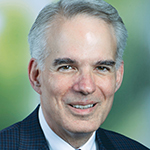
Fr. Cardone
Fr. Cardone says Catholic health care always has centered its work around the Gospel value that all people are created in the image and likeness of God and all deserve to be treated with respect and compassion. "And our mission at Bon Secours Mercy Health is rooted in all of that. And it's not that we weren't doing that before, it's just a more intense, focused, deliberate and consistent message" now.
"Catholic health care has always seen itself as a social actor in the communities in which it finds itself. So, looking out and seeing health disparities and the disproportionate impact that COVID has had on people of color prompts us to ask: 'What can we do? How can we respond?'" And that response can and should include gaining a full understanding of people's needs and responding to them with compassion, he says.
"As we strive for racial justice we should not be paralyzed by the enormity and the magnitude of the task at hand. We should recognize that we are not going to be able to completely resolve the sin of racism, but we can make a positive impact. We can ameliorate the scourge of racism through what we're doing."
— JULIE MINDA
Thomas Elliott
Chief executive, Mercy Rehabilitation Hospital Oklahoma City
While some people see the protests in response to racial injustice as the start of a movement, Thomas Elliott thinks the demonstrations are "the end of a lot of years and efforts that have been put into being heard."
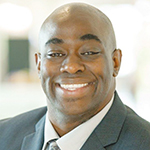
Elliott
Elliott says people outraged by brutal racial incidents in their own communities have been connected through social media and are now united by the realization that injustice is widespread and needs to be confronted across the nation. "You see people that have a shared intention coming together to say, 'Hey, we want to give attention to this matter that has otherwise been ignored,'" he says.
He is encouraged by the attention that the calls for racial equity and justice are drawing, including from organizations such as major sports leagues and corporations for which "the concept of 'Black lives matter' was something that was not talked about or was seen as a negative aspect or didn't need to be discussed within the walls of professional settings."
To make their embrace of change impactful, however, he thinks employers must go beyond words to action, such as by revising recruitment policies and having people of color on their boards of directors. "There has to be something that's tangible to make it meaningful," he says.
Elliott says he is always aware that as a Black man in the executive ranks he is "nontraditional" so he is mindful of a need to show his own impartiality when it comes to race. He says: "I have to go on the floor and have a representation and presence that is accepting and open to all of the team members here, black, brown, white, etcetera."
Nevertheless, he is determined for his voice to be heard among those urging change. He supports calling attention to racial disparities, including in health care, with the goal of figuring out how to end them. "It's being intentional about where we have those differences (in how people are treated) and correcting it," he says.
— LISA EISENHAUER
John Capasso
Executive vice president of Trinity Health, Livonia, Michigan
Racial justice protests have spurred conversations about race in people's daily lives that otherwise might never have started, John Capasso says. His own discussions with colleagues and friends of color have led to enlightening and sometimes jarring revelations. Several co-workers have talked about how before they let their children get a driver's license, they give strict instructions on how to react during a police stop to prevent it from escalating into a tragedy.
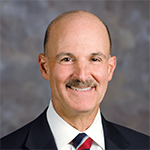
Capasso
"It's absolutely horrible that such conversations have to be a standard practice within families." Capasso adds, "It is so very important that we are truly listening and hearing people's stories." Such conversations have made him more aware of the racism and the threat level people of color experience in daily life, including in the workplace.
"I think as leaders we have a responsibility to be much more vigilant, much more alert and much more sensitive to insidious racism," he says. "We have to consider that there may be, although inadvertently, policies and procedures that lead to unconscious biases within our ministries."
Capasso says Trinity Health is confronting systemic racism, injustice and disparities through these priority actions in FY 21:
- Declaring racism a public health crisis, addressing the racial inequity of COVID-19 and advancing comprehensive health care for all.
- Reviewing and updating all HR policies and practices to reinforce and promote equity and mitigate the impact of structural racism.
- Making mandatory annual cultural proficiency training for colleagues and de-escalation training for all employed or contracted security staff.
- Increasing the purchase of goods and services from minority-owned companies over the next three years.
"As an organization where diversity, equality and inclusion are core to our Catholic heritage, we are using our voice to speak out on social injustices," he says.
— LISA EISENHAUER
Tabiri Chukunta
Executive director, community outreach, and diversity and inclusion officer, Saint Peter's Healthcare System, New Brunswick, New Jersey
Born and raised in eastern Nigeria, Tabiri Chukunta fought and nearly died in the country's civil war when he was still a teenager. In 1973, at age 22, he emigrated to the U.S., settling in New Jersey. Eight years after his arrival, he became a part-time parking lot attendant at Saint Peter's University Hospital. Chukunta worked his way up at Saint Peter's — and in the process, earned a bachelor's degree, two master's de–grees and a doctorate in ministry.
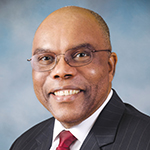
Chukunta
He says George Floyd's homicide and the civil unrest that followed has awakened in him "feelings that our world, sad to say, is still not free of hatred and different types of genocide. And for me it has reinforced what I had all along known: that we have to be intentional in achieving equity."
Chukunta notes that Saint Peter's was intentional in organizing the department he directs — community outreach and diversity and inclusion — under the mission department. That positioning "speaks to what the hospital is trying to achieve," he says. As part of his role, he helps organize educational events to teach associates about Saint Peter's diverse patient populations and build their cultural competency so community members feel welcomed, understood and well-served.
Chukunta says a main objective — both for him personally and for Saint Peter's the organization — is "building one family of diverse people." Paraphrasing the words of Dr. Martin Luther King Jr., he adds, "What I say to people is when I get to know you and you get to know me, the distance becomes shorter, and when the distance becomes shorter, we begin to find out how we are alike and different at the same time."
He says his Christian faith makes him optimistic. He prays that the current unrest will cause people to join together and to "realize that as Dr. King said, if we don't live together as brothers and sisters, we will perish together as fools. The only way out is to love one another."
— JULIE MINDA
Ali Santore
Senior vice president of government affairs and social responsibility for Providence St. Joseph Health, Irvine, California
Ali Santore sees this year's widespread street protests and racial justice marches as "a long-building racial justice reckoning. It's an intersection of the anxiety and the helplessness that everyone has felt due to a myriad of issues," Santore says.
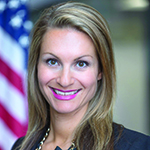
Santore
Much of her advocacy work for Providence St. Joseph Health covers social issues — including urging solutions to climate change and promoting the system's pledge to be carbon negative by 2030.
"The Catholic health care ministry has a long history of advancing social justice and I think that the protests brought to light that we can and should do more," she says.
To provide an outlet for some of the anger recent events have ignited, Santore helped Providence St. Joseph Health set up its Vote for Health campaign. The campaign was launched this summer on the health system's websites and social media channels. It cites the pandemic and the "nationwide social justice reckoning" in urging people to vote in November and to consider that protecting Medicaid and Medicare and supporting public health and mental health will improve the quality of life for Americans. It has included voter registration drives at the system's facilities and bringing in mobile polling stations.
"We've never before provided the direct access" to the voting booth for caregivers and patients. "That really came from the unrest that we were seeing across our communities," Santore says. She wants to ensure caregivers know their voice matters regardless of political affiliation.
— LISA EISENHAUER
Mary Starmann-Harrison
President and chief executive of Hospital Sisters Health System, Springfield, Illinois
In 1908, deadly, anti-Black race riots broke out in Springfield, Illinois, near HSHS St. John's Hospital, where the Hospital Sisters of St. Francis treated those injured in the riots, no matter their skin color. The race riots led to the founding of the NAACP and have an impact on HSHS to this day.
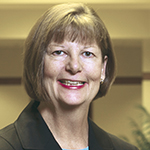
Starmann-Harrison
"The sisters' history tells us that they cared for patients from the race riots, both black and white, side by side, in the hospital hallways," Mary Starmann-Harrison says.
She and her leadership team are finding inspiration in the sisters' response to that strife for responding to the current period of social unrest. "The journal entries around the race riots have been a special part of our history and we've always been very sensitive to it," she says. "And so it took us right back in history and just magnified why our efforts have to be focused on a more urgent approach."
One way she and her health system are approaching the unrest, she says, is to see that all decisions are being made with the entire community in mind — for example, making sure COVID-19 testing is available to everyone in the communities the system serves.
In recent months HSHS has added implicit bias training for all employees and laid the groundwork for a diversity council to address issues of inclusion, equity and fairness among workers.
"It's not a project, it's not a separate effort," Starmann-Harrison says of promoting equity. "It can't be just a separate policy on diversity and inclusion. It has to be incorporated in everything we do each and every day and I think that's a big takeaway for us."
— LISA EISENHAUER
Odesa Stapleton
Chief diversity and inclusion officer, Bon Secours Mercy Health
Odesa Stapleton says the widespread civil unrest experienced in the U.S. this year is a "reminder that racism is embedded in our society on so many levels and it's our responsibility to renew our commitment to help dismantle it."
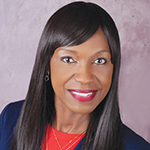
Stapleton
She says one impact of both overt and subconscious racism has been that there are measurably poorer health outcomes for members of some minority groups as compared with whites when they are treated for the same conditions. As one way to address that, Bon Secours Mercy Health is teaching clinical staff to be more aware of unconscious bias and care disparities. In one such educational session, a Caucasian physician asked Stapleton how he could gain the trust of his Black patients.
Stapleton encourages clinicians and other associates to ask people of color how they can earn their trust. "That shows the care, the compassion, the concern that comes with being a provider."
She says that when it comes to the ministry's healing work, and race relations in general, to move forward in a positive way, "I do believe we need to step out of our comfort zones and welcome all people and focus on that human dignity and share that compassion. We need to embrace people, meet them where they are. If you make other people feel that they are important — and sometimes we have to be vulnerable to do that — then they will see Christ in us."
— JULIE MINDA
Hunter Richardson
Chief human resources officer for Franciscan Missionaries of Our Lady Health System, Baton Rouge, Louisiana
When Hunter Richardson reflects on the disparities that spurred protests in recent months and that have been manifest in the uneven toll COVID-19 has taken on some populations, he remembers when Franciscan Missionaries of Our Lady Health System identified a need for housing among people disabled by HIV/AIDS and opened St. Anthony Home in response. He also thinks about how racial equity is an intrinsic part of Catholic social teaching.
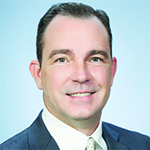
Richardson
"As we look at recent events and start to understand more about racial disparity and health equity, I think we again have an opportunity as a Catholic ministry to lead the way," Richardson says. "And we recognize having those principles isn't always popular, but I think it requires us to think, speak and act differently in our approaches."
That must include being more intentional in addressing the calls for justice within ministries and within the communities they serve, in Richardson's view. Within ministries that can mean offering education on unconscious bias and how it can affect care plans. Within communities it includes collaborating with leaders and agencies to offer support to the disadvantaged.
Richardson believes that despite the rancor that seems to be pulling the nation apart, the prospect for a positive outcome remains. "I think it will be dependent on how willing people are to come to the table and be open to hearing different perspectives and having conversations in a peaceful and respectful way," he says.
He sees part of his job as making sure that FMOLHS allows and encourages people to discuss their differences. "As a people leader for our organization, I'm ensuring that folks are comfortable having the uncomfortable conversations," he says. "I think that's a big charge for us."
— LISA EISENHAUER
Ji Im
Senior director, community and population health, CommonSpirit Health, Chicago
The calls for social justice and the protests that have roiled the nation in recent months have emboldened Ji Im. She has always been a supporter of racial equity, diversity and inclusion. "What has changed has been to take action and to be more vocal about what I believe in and to make changes on the platforms that I've had the privilege of having," Im says.

Im
Im says the focus of her work is to find ways to improve health outcomes for people within the communities CommonSpirit Health serves, especially those who are poor and vulnerable.
"I'm more determined to serve the vulnerable population and address social determinants of health to create more equity in our communities, in collaboration with our partners — those we collaborate with today and the nontraditional partners we need to reach out to and engage. The time is now."
Im sees communities as she sees her garden — a place where plants thrive with sunlight, water and soil. In healthy communities, organizations, including Catholic ministries, help create an environment that gives everyone an opportunity to flourish, she says.
"The way that I would define the opportunity to flourish is taking care of people to be the best version of themselves at work, at home and in the communities we all live in. It also means providing people with opportunities to contribute and grow where they can and want to, and to collectively create safe spaces to have dialogues that allow for improvement and growth, recognizing that different views allow for better solutions."
— LISA EISENHAUER
CHA is working with its members on an initiative to address racism and health equity. As Catholic health care, we are committed to achieving equity in the health care we provide, in the communities we serve, and in the nation as a whole. Our ministry is uniquely positioned to be a leader in this effort based on our long history of caring for everyone regardless of race or socioeconomic status and our deep commitment to the social teachings and moral principles of the Catholic faith. Stay tuned over the coming months to learn more about the initiative.